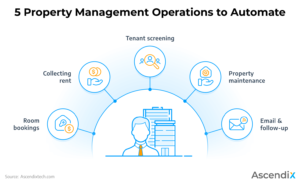CRM sales automation streamlines the sales process, boosting efficiency and accuracy. It automates repetitive tasks, giving sales teams more time to focus on selling.
Sales teams juggle numerous tasks daily, from lead tracking to closing deals. CRM sales automation tools play a vital role in helping businesses optimize these processes. By automating mundane tasks such as data entry, scheduling follow-ups, and updating sales records, sales professionals can concentrate on building relationships and crafting strategies that drive sales.
These intelligent systems track interactions with potential customers, providing valuable insights that assist in personalizing the sales approach. As a result, businesses equipped with CRM sales automation can anticipate customer needs, respond promptly, and improve overall sales productivity, all while maintaining a robust pipeline and a clear view of their sales funnel. This leads to better customer experiences, streamlined sales cycles, and increased revenue.
Benefits Of Crm Sales Automation
CRM Sales Automation revolutionizes how businesses approach their sales processes. From boosting efficiency to forging stronger bonds with customers, automating CRM offers a wealth of advantages. Let’s break down the key benefits that make CRM Sales Automation an indispensable tool for sales teams aiming to achieve stellar results.
Increased Efficiency
One of the primary advantages of integrating CRM Sales Automation is the remarkable jump in efficiency. Manual data entry, a time-consuming and error-prone task, becomes a thing of the past. Here’s how efficiency gets a boost:
- Automating Tasks: Routine activities like follow-ups, email campaigns, and updating sales records happen without human intervention.
- Centralized Data: All client interactions and sales data reside in one place, making access quick and reliable.
- Streamlined Sales Cycle: The sales process speeds up as leads move smoothly from one stage to the next.
Improved Sales Productivity
When CRM sales tasks are automated, sales teams witness a significant uptick in productivity. Here’s how automation propels sales teams toward better performance:
- Prioritize Leads: With CRM systems, scoring and sorting leads happen automatically, ensuring the focus stays on the most promising prospects.
- Real-time Data: Access to up-to-the-minute information allows for quick decision-making and personalized pitches.
- Reporting: Generating reports is swift and effortless, which aids in measuring success and analyzing trends.
Enhanced Customer Relationships
At the heart of sales lies the customer relationship. CRM Automation isn’t just about closing more deals; it’s about building lasting connections with clients. This is accomplished by:
| Features | Benefits |
|---|---|
| Personalized Communication | Craft tailored messages based on customer data. |
| Customer Insights | Understand needs and preferences for better service. |
| Follow-up Automation | Never miss an opportunity to engage or re-engage. |
With CRM Sales Automation, every touchpoint is an opportunity to delight and retain customers. Sales teams can foster trust and demonstrate value consistently, translating into stronger relationships and repeat business.

Credit: www.facebook.com
Key Features Of Crm Sales Automation
CRM sales automation simplifies complex sales processes. It nurtures customer relationships efficiently. Sales teams benefit from streamlined tasks. This leads to increased productivity and revenue. Let’s delve into the key features that make CRM sales automation an indispensable tool for sales professionals.
Contact Management
Centralized database: All client information in one place. Easy access for sales teams leads to better engagement and informed decisions.
Detailed client profiles: Keep track of interactions, preferences, and history. Personalize sales approaches for better outcomes.
Segmentation capabilities: Group contacts for targeted marketing efforts. Increases effectiveness and efficiency of campaigns.
Sales Pipeline Management
Sales pipeline management provides a visual overview of sales stages. Sales representatives see where each deal stands. They prioritize effectively to close more sales.
- Visual sales pipelines: Easy to understand and manage.
- Deal progression tracking: Know the next steps to move deals forward.
- Forecasting tools: Predict sales trends and prepare accordingly.
Task And Activity Tracking
Task and activity tracking ensures nothing falls through the cracks. Sales teams stay on top of their duties without missing a beat.
- Automated reminders: Never miss a follow-up or meeting.
- Customizable task lists: Tailor workflows to team needs.
- Performance metrics: Measure success and improve strategies.
Implementing Crm Sales Automation
CRM sales automation transforms how companies interact with customers. It streamlines sales processes. It boosts efficiency. It makes customer relationships stronger. To succeed, you need to implement it right. This section guides you through choosing, customizing, and adopting a CRM system. Dive in and supercharge your sales operations!
Choosing The Right Crm System
Selecting the perfect CRM is crucial. You have tons of options. Start by listing your needs. Align them with your sales goals. Think about your team’s size. Consider your budget. Look for a system with essential features like lead tracking, sales forecasts, and easy integration. Compare top CRM providers. Read reviews. Take advantage of free trials. Make an informed decision.
Customizing The Crm Solution
Next, tailor your CRM to fit like a glove. Each business is unique. You should modify your CRM to match your workflows. Add custom fields for data that matters to you. Set up automation for repetitive tasks. Personalize communication templates. Ensure it connects with your other business tools. A custom CRM boosts productivity and effectiveness like nothing else.
Training And Adoption
The last step is crucial: train your team. Change can be hard. Ensure everyone knows how the CRM works. Provide resources and learning tools. Schedule training sessions. Start with basics. Move to advanced features. Be patient. Offer support. Track usage and encourage adoption. Positive reinforcement helps. A well-trained team will take full advantage of the CRM.
Best Practices For Crm Sales Automation
Best Practices for CRM Sales Automation bridge the gap between technology and effective sales strategies. To capitalize on CRM sales automation, it’s crucial to embed best practices into your sales framework. These not only streamline operations but also ensure customer data turns into profitable action. Let’s dive into how sales teams can maximize their CRM’s potential.
Aligning Sales Processes With Crm
For CRM sales automation to succeed, sales processes must sync perfectly with the CRM system. Teams should map out their sales stages within the CRM to reflect their actual workflow.
- Customize pipelines to mirror the ways deals progress.
- Ensure user adoption with training centered on CRM benefits.
- Create consistency by using standardized CRM templates for quotes and emails.
Regular Data Maintenance
Keeping CRM data clean is non-negotiable. A well-maintained database powers reliable automation and insights.
- Regularly scrub data to remove duplicates and outdated information.
- Set up data entry standards to ensure uniformity.
- Conduct periodic audits to ensure data quality.
Integration With Other Systems
CRMs offer more value when integrated with other business applications. This creates a unified platform for all customer interactions.
| System | Integration Benefit |
|---|---|
| Email Marketing | Automate follow-up communications based on customer actions. |
| Accounting Software | Sync invoices and payments with customer profiles for a clear financial view. |
| Social Media Platforms | Track engagement and tailor social campaigns through CRM insights. |
Measuring Success With Crm Sales Automation
Understanding the impact of CRM sales automation is crucial for businesses aiming to thrive. By dissecting the data and employing the right metrics, companies can gauge the efficacy of their sales processes. Let’s dive into the key aspects of measuring success in a CRM-driven sales ecosystem.
Key Performance Indicators
Pinpointing what to measure is step one. Key Performance Indicators (KPIs) serve as the compass for sales success. Leading indicators can include:
- Conversion Rates: Tracking the journey from lead to customer.
- Sales Cycle Length: The time it takes to close a deal.
- Customer Lifetime Value (CLV): Predicting revenue from a customer over time.
Measuring these KPIs before and after implementing automation tools highlights the system’s effectiveness.
Data Analytics And Reporting
CRM platforms are treasure troves of data. Data analytics and reporting features cut through the noise to reveal patterns and insights. They empower sales teams with:
- Real-time data dashboards.
- Custom report generation.
- Forecasting tools for future sales.
With accurate data, teams personalize customer interactions, streamline the sales pipeline, and ultimately boost revenue.
Continuous Improvement
The sales landscape is ever-evolving. Achieving success with CRM automation means embracing continuous improvement. This involves:
| Activity | Goal | Frequency |
|---|---|---|
| Feedback collection | Enhance user experience | Ongoing |
| Training sessions | Improve team skills | Quarterly |
| Process reviews | Refine strategies | Bi-annual |
By continuously analyzing performance and iterating on strategies, businesses ensure that their CRM sales automation system not only remains relevant but also drives sustained growth.

Credit: www.salesforce.com

Credit: www.mckinsey.com
Frequently Asked Questions Of Crm Sales Automation
What Is Crm In Sales Automation?
CRM (Customer Relationship Management) in sales automation refers to software systems that streamline customer interactions, sales tracking, and related workflow processes. These systems enhance efficiency and improve sales management by automating repetitive tasks.
How Does Sales Automation Improve Productivity?
Sales automation improves productivity by automating routine tasks, such as data entry and follow-up emails. This lets sales teams focus on higher-value activities like closing deals and building customer relationships.
Can Crm Software Help With Lead Generation?
Yes, CRM software can significantly aid in lead generation. It helps capture leads from various channels, score them based on potential, and nurture these leads with personalized communication, increasing the likelihood of conversion.
What Are The Benefits Of Integrating Crm And Sales?
Integrating CRM and sales helps ensure that customer data informs sales strategies, enabling personalized engagement and quicker response times. This integration leads to better lead management, higher conversion rates, and increased customer satisfaction.
Conclusion
Embracing CRM sales automation transforms your business approach, streamlining processes and boosting productivity. It ensures your sales team focuses on what they do best—selling. As technology marches on, staying ahead means adapting, and CRM tools are the key. Start your journey now and watch your sales soar.




